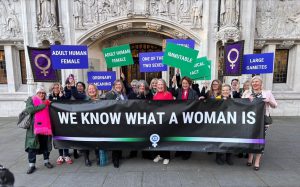The Supreme Court has unanimously decided that, in law, a Woman is a person born female, while Sex is binary and a matter of biology. The Court has upheld  law, science and the common-sense understanding of language and physiology shared by most people.
law, science and the common-sense understanding of language and physiology shared by most people.
The decision clarifies something which should never have been in question. Women’s rights have for years been undermined by false interpretations of the law, deliberately promoted by an aggressive and well-funded trans-activist lobby, supported by influential gender ideologues in government and council departments, schools, health services and the criminal justice system – even charities and private companies, whose C.E.O.s showed scant regard for female clients and customers.
A man was a woman if he said he was and anyone who questioned this was accused of ‘hate’ or ‘unkindness’. Women who objected were pilloried as ‘Terfs’ (trans exclusionary radical feminists). Some lost jobs, while others were forced out of university courses or welfare services. Some vulnerable prisoners had to ensure imprisonment with male abusers. Ordinary women who challenged this  orthodoxy were threatened with violence, including rape and death threats. The recent London demonstration against the Supreme Court ruling provided graphic evidence of this, along with a clear illustration of the Metropolitan Police’s shameful reluctance to challenge it.
orthodoxy were threatened with violence, including rape and death threats. The recent London demonstration against the Supreme Court ruling provided graphic evidence of this, along with a clear illustration of the Metropolitan Police’s shameful reluctance to challenge it.
Sex was always a legally ‘protected characteristic’ under the Equality Act, but for years public servants treated it as if it was not. The word ‘Sex’ was omitted from policy documents, equality statements, HR application forms, even health and crime records, frequently replaced by the word ‘gender, understood as a self-discerned personal identity.
Despite the fact that ‘gender reassignment’ is a protected characteristic, while ‘gender’ and ‘gender identity’ are not, those with power over our lives, from minor officials to heads of major organisations, taught us to act as if the law had changed, that sex could be assigned rather than observed and that ‘non-binary’ identities are scientifically valid and trump biological sex. This was what came to be known as “Stonewall law”, and it ruled supreme in many places, including Brighton & Hove, where across the city traditionally women-only services were quietly abandoned and, in schools, children were told lies.
In the same year, our NHS Health Trust gained national publicity as the first to introduce gender inclusive language to maternity services, such as “chest feeding”, “birthing parent”, while the words “woman” and “mother” quietly disappeared from documents (significantly, men’s health leaflets retained sex-specific language).
Also in 2021, while the Trust paraded its progressive credentials, its maternity services were reported by the Care Quality Commission (CQC) to be “unsafe, inadequate and poorly led”. Things didn’t improve. In 2024, a further CQC report rated inpatient maternity services as “inadequate”, citing problems with staffing, training, unsafe practices, and poor governance. In the wake of these reports, nine bereaved families have called for a national inquiry into our maternity services.
Elsewhere in Brighton, Sussex University has been fined £585,000 by the Office for Students (OfS) for failing to uphold freedom of speech, particularly concerning gender identity. The University gained notoriety when its students pursued a public campaign of harassment against Professor Kathleen Stock, a lecturer who had questioned gender ideology. The bullying was so severe that Sussex Police said they couldn’t guarantee her safety. Eventually, again in 2021, she was forced out.
Local academics, students and the police need to re-examine their behaviour and decisions in this case, because Professor Stock did nothing more than uphold the law and courteously assert scientific fact. She deserved respect and effective protection. Her treatment shames us all.
Another local woman badly betrayed is Sarah Summers, a survivor of male sexual abuse, who in 2021 turned to Brighton charity Survivors Network for help. She attended weekly group sessions with other women survivors which was helpful and supportive. However, when a trans-woman joined her women’s group, she no longer felt safe and left the group, asking if a single-sex group for women could be provided.
Despite there being another specialised group available for trans, non-binary and intersex survivors, she was told it was charity policy to allow anyone identifying as a woman to join its women’s group. Network staff advised Ms Summers to find another service in Brighton, though none existed. She was reportedly removed from the Network’s mailing list and blocked on Twitter (now X). Ms Summers is taking Survivors’ Network to court on the grounds of sex discrimination. In the years she has been waiting for her case to be heard, our city has continued to deny women and girls sex-specific services.
Given the Supreme Court’s ruling, all national and local government policies and practices touching on equalities need to be urgently reviewed and amended to ensure full compliance – including in our city. However irritating it may have been to witness the Cabinet’s recent apparent change of heart, along with its shameless assertion that it has “always” protected sex-based services, this undignified reverse ferret will assist legally-exposed local charities, councils and NHS trusts (such as our own) to make the changes needed.
However, if decisive action to protect sex-based rights is not taken, I predict a flurry of successful local legal actions. Such defeats may arguably be richly deserved, but they will cost local taxpayers dear.
